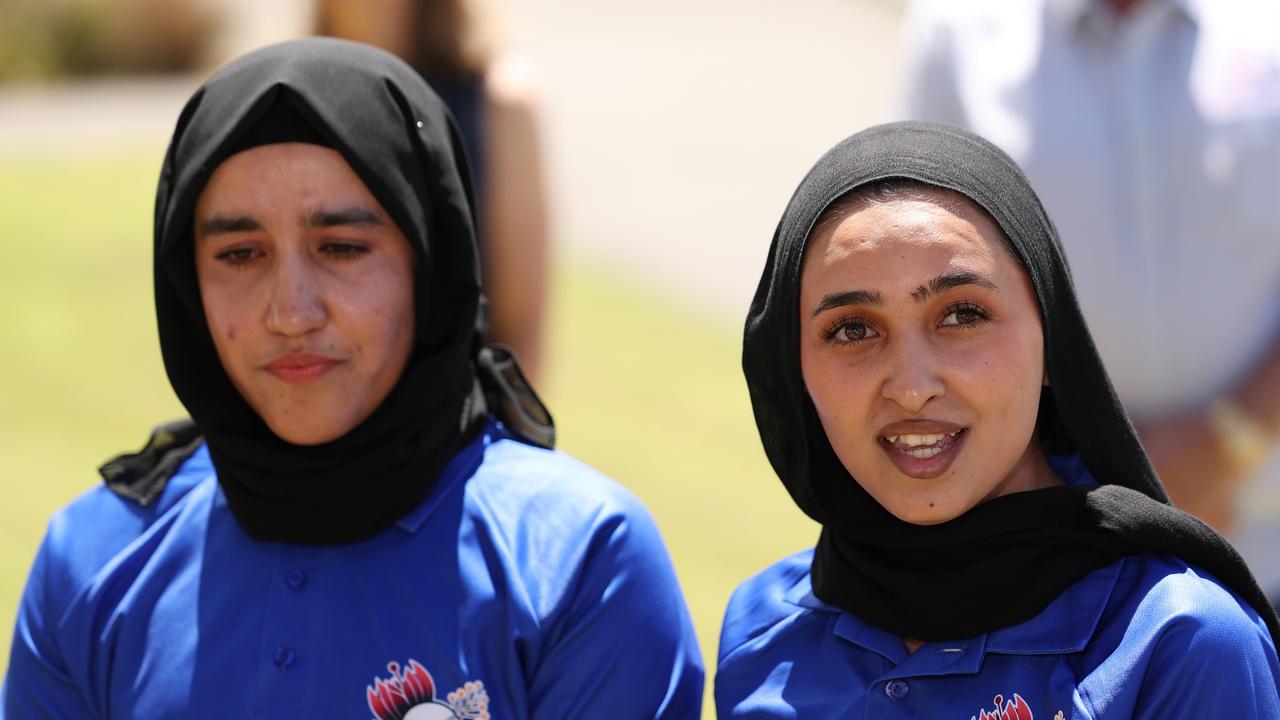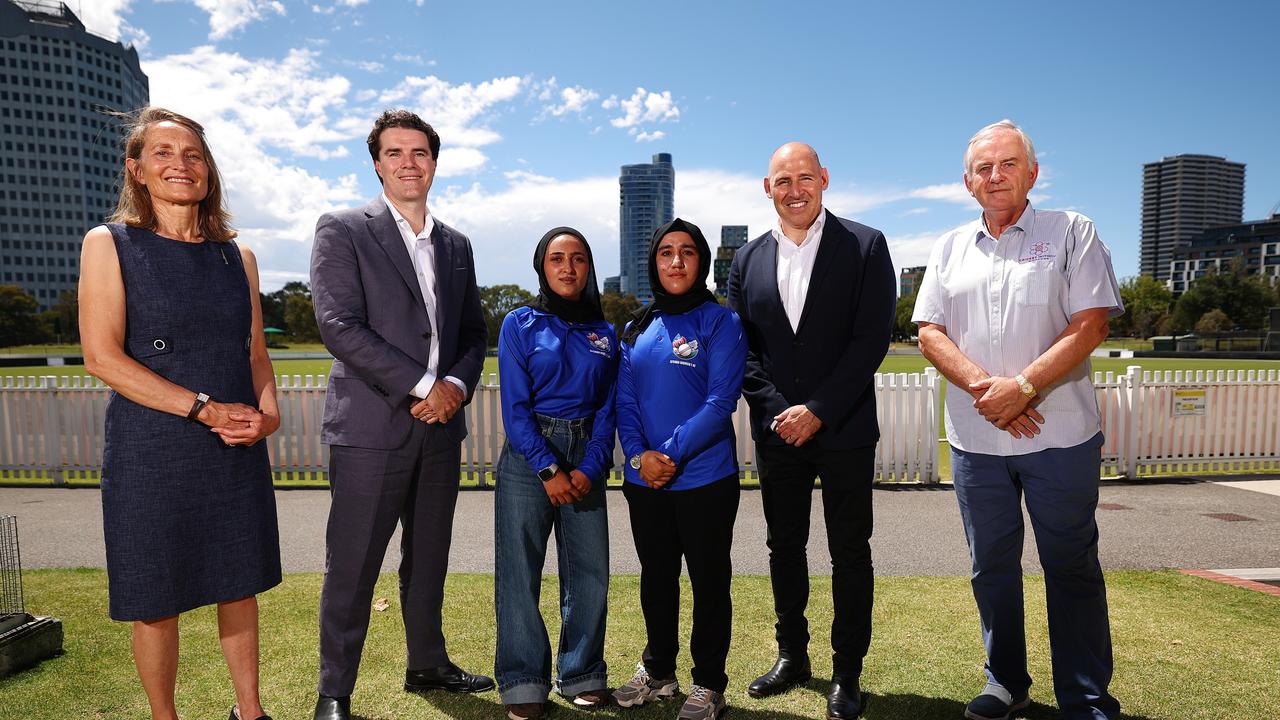Physical Address
Suite 5, 181 High Street,
Willoughby North NSW 2068
Physical Address
Suite 5, 181 High Street,
Willoughby North NSW 2068

Healy pushing to prove fitness for Test | 03:32
In August 2021, Mel Jones was in two weeks’ hard quarantine in a Melbourne hotel when she received a message from Indian journalist Sharda Ugra, asking if she’d been in contact with any members of the Afghanistan women’s cricket team.
Watch every ball of The 2025 Women’s Ashes Series LIVE with no ad-breaks during play on Kayo | New to Kayo? Get your first month for just $1. Limited time offer.
With the Taliban closing in on Kabul, the national women’s football team had already fled Afghanistan, so Ugra implored Jones to touch base with cricketer Benafsha Hashimi to check on her wellbeing.
“You don’t know who I am,” Australian cricket great Jones messaged Hashimi.
“But do you, and any of the players, think that your lives are in threat, and would you like to look at potentially getting out?”
Hashimi replied immediately with a voice message: “Yes, we do.”
Over the following fortnight, Jones set up a “backyard immigration office” in her hotel room, liaising with the Australian Government to help organise humanitarian visas for Hashimi and her teammates. What started as a list of 19 contracted players quickly grew with the addition of coaches, administrators, members of the Afghanistan Cricket Board and relatives.
Soon, 135 names were seeking humanitarian visas, fearful for their lives and desperate to get out of Afghanistan.
“The list got very big, very quickly,” Jones explained.
“The Australian Government said there’s not a chance that this will fly. But in the end, we got 130-plus out.”
The plan was for the cricketers to cross the Pakistani border and travel to Islamabad, where they would undergo a mandatory two-week quarantine before flying to Australia.
However, first they needed to get out of Afghanistan.
“That was probably the most stressful part of it,” Jones said.
“The Taliban had taken over Kabul, but there were a lot of different militant groups that had power over sections all the way along the border as well. ISIS had a section.”
The players were tasked with fabricating cover stories, such as travelling to Pakistan to visit a sick family member in hospital. They also needed to burn uniforms and cricket equipment, any paraphernalia that exposed them as professional athletes, or had ever played sport for that matter.
Local volunteers, including some Australians residing in Afghanistan, helped co-ordinate the evacuation while the players hid documentation as they lied their way through multiple security checkpoints.
“It was all done under secrecy,” Jones said.
“We had to do it at different times, all the families couldn’t just leave at once, because it looked too obvious, and then they had to find solid enough stories for when they got to the gate on why they were going to Pakistan.
“Then it was just drip-feeding them through the border.”
Two groups resorted to crossing the border illegally, with the Pakistani Government refusing to let them leave the country when they arrived in Islamabad. But after six months of living through some “pretty horrendous” conditions in the Pakistan capital, they all touched down in Australia.
Nine of the Afghan players arrived in Canberra, with the remainder settling in Melbourne. More than three years later, they’re still in Australia, uncertain whether they’ll see their family and friends again.
The Taliban’s oppression of women, which includes a ban on playing sports, studying and working, has worsened since the Islamist group regained control of Afghanistan. University education for women has been suspended, while they have also been banned from gyms, public baths and public parks.
Women are forced to cover their entire bodies, including their faces, when they leave the house, which they can’t do without a guardian. More recently, the Taliban introduced laws that prohibited women from speaking in public, while they can’t be overheard signing or reading aloud from inside their own homes.
Anyone who defies these rules risks being sent to prison or stoned in public. It’s why some of the cricketers are unwilling to speak out against the Taliban due to fear of the ramifications for family back home.
“Horrendous doesn’t cover it. You have nothing to live for,” Jones said of life for women in Afghanistan.
“You can’t go to school, no education. There are decrees by the Taliban about not speaking to anyone outside your family.
“You can’t sing, you can’t read poetry, you can’t do anything.
“It’s getting worse. It’s prison.”
The Afghanistan Cricket Board awarded 25 women national contracts in November 2020, three years after the country acquired full member status from the ICC.
The women’s team was preparing to play their first competitive match against Oman in September 2021, but the Taliban’s untimely takeover ended the players’ dream of representing their country.
“They’d signed their contracts, they were training,” Jones said.
 Cricket Without Borders Founder & Chair Clare Cannon, Federal Assistant Minister for Foreign Affairs Tim Watts, Firoza Amiri of the Afghanistan XI, Nahida Sapan of the Afghanistan XI, Cricket Australia CEO Nick Hockley and Cricket Without Borders Director Ken Jacobs.Source: Getty Images
Cricket Without Borders Founder & Chair Clare Cannon, Federal Assistant Minister for Foreign Affairs Tim Watts, Firoza Amiri of the Afghanistan XI, Nahida Sapan of the Afghanistan XI, Cricket Australia CEO Nick Hockley and Cricket Without Borders Director Ken Jacobs.Source: Getty Images“It wasn’t all roses, but things were progressing in a way that they were pretty happy with.
“It was so close. It was just around the corner. They were getting uniforms, thinking that they’d be playing underneath the Afghanistan flag and the Afghanistan colours a month down the track, only for that to be pulled away.”
Upon arriving in Australia, the Afghan refugees set about rebuilding their lives with minimal funds while learning English. Some studied, some found work, but after a while, they each joined local cricket clubs.
Olivia Thornton from Cricket ACT helped organise teams for the players in Canberra, while those in Melbourne joined clubs in Carnegie and Dandenong. With their love for the game reignited, they even braved the weather for winter cricket.
“If I didn’t think they were brave enough to leave Afghanistan, playing cricket in the middle of winter in Melbourne is right up there as well,” Jones laughed.
“They’re loving the fact that they’re playing cricket, they’re loving the fact that they’ve got freedom to go out and express themselves.
“But there is still severe trauma for them. Physical health, mental, emotional, spiritual, financial, all those traumas.
“It’s hard as an Aussie to put yourself in their shoes, to try and figure out what it’s like to be ripped from family and friends overnight, and potentially think that you’re never going to see them again.
“It’s been exceptionally hard.”
Elsewhere, the Afghanistan men’s team has gone from strength to strength over the last 18 months — after defeating England, Pakistan and Sri Lanka during the 2023 World Cup in India, Rashid Khan’s side claimed a historic victory over Australia to qualify for last year’s T20 World Cup semi-finals.
But while their success has become a source of pride for the war-torn nation, the women’s players watched on with mixed emotions.
In July last year, the team penned an open letter to ICC chair Greg Barclay, pleading for the sport’s powerbrokers to support the establishment of a refugee team in Australia.
They never heard back.
They felt forgotten and abandoned.
“All they want is that opportunity to have a voice and to be heard,” Jones said.
“They’ve never been responded to or spoken to, just to get their side of things (across), at least to put a case forward. That’s been probably their biggest disappointment.”
In response to the Taliban’s treatment of women, Cricket Australia has withdrawn from bilateral series against Afghanistan, while there’s an ongoing push for England and South Africa to follow suit.
CA’s boycott has received a mixed response – most notably because Australia continues playing Afghanistan in ICC events while bilateral series aren’t as commercially attractive – but the issue continues to divide cricket’s powerbrokers. ICC full members are required to have an active women’s side, but the ACB or national men’s team are yet to be sanctioned.
It isn’t a straightforward issue, but Jones applauded CA for shedding light on the situation.
“Not playing bilaterals gets more people talking about it to try and find a way forward,” Jones said.
“If we don’t do that, these women would have just been left to their own devices, and nothing would have transpired. So from my perspective, Cricket Australia’s stance has allowed more people to say, ‘Oh, that doesn’t seem quite right.’
“At least you’re getting more different thoughts at the table to try and find a way to allow these women to continue their cricket.”
The Afghanistan cricketers will play an exhibition T20 contest this Thursday, facing a Cricket Without Borders XI at Melbourne’s Junction Oval. It will mark the first time they’ve played together since fleeing Afghanistan.
“It’s really special for us, especially for Afghan women, because this is a very historic moment for Afghan women. We can show, when we play on this ground, we play for Afghanistan,” captain Nahida Sapan said this week.
“This is a win for Afghan women because we have a big hope for this match – this match can open doors for Afghan women for education, sport and the future.
“Together, we are building not just a team, but a moment for change and progress.”